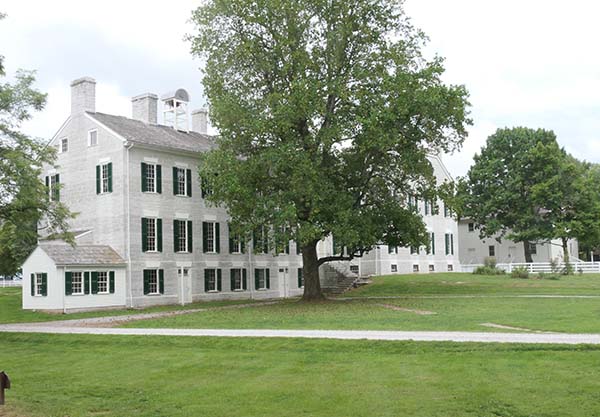Earlier this month, my parents and I visited my brother and his family in Lexington, Kentucky. It was the first time I had been to his home, and it was the first time that I got to meet my young nieces. I'd met the oldest one a few years ago briefly when she was very young. We had a day to do something, and being a Sunday, most places are shut. We decided to go to Shaker Village of Pleasant Hill, which has 3,000 acres of land once home to a Kentucky Shaker community between 1805 and 1910. It was the third largest Shaker community in the United States. Pleasant Hill Shaker Village ceased in 1910, and an effort to preserve it as a museum started in 1961.

The Shaker buildings and farm can be explored to admire the architecture, and some of the buildings contain information about the Shakers and some of their items. A couple of buildings contained crafts and a shop, and there was a cafe too. Other buildings served as hotels or guest rooms with some of them being split into museums and guest houses. The Shakers were known for their craftmanship for creating well-built furniture and items, such as brooms.

Shaker communities all lived together in a commune and worked on daily activities. They were a religious community, and their homes contained areas for religion, schooling for the children, work areas, and living areas. The large house contains bedrooms where the families lived together, and there's also a school house. There's a large meeting house with a single large room that was used to hold events, meetings, and religious services. The Shakers were named as such for their active movements - dancing and shaking - during their religious services.

The Shaker movement began in the 1700s, and large camp meetings were held with preaching for long periods alongside music and dancing. The community in Kentucky had members sent from New York, and at the time, it would have been a remote place to live.

The Shakers at Pleasant Hill began some decline during the Civil War because they bought and freed slaves; this angered the community, who destroyed some of their buildings. Soldiers who fought in the Civil War on both sides came to them begging for food, and some of the Shaker men then left to fight in the armies. Their lifestyle continued to be less ideal and population or members dwindled.

I explored the large house and its many rooms over four floors.



Opposite was the meeting house, which I also explored.



The cafe had guest rooms above it and a gift shop. The staircase was well-built.



The farm had goats, turkeys, cattle, llama, ducks, and more. There were baby ducklings that had just hatched in an incubator.

Fruit and vegetables could be picked and taken away.





I also got to see a couple of barn cats.

Leave a comment